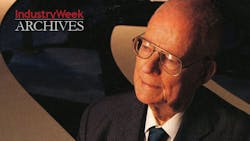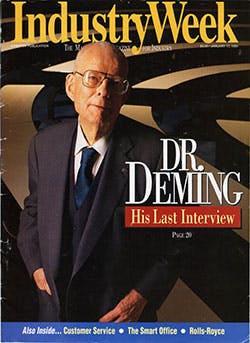Dr. Deming: 'Management Today Does Not Know What Its Job Is' (Part 2)
Editor's Note: IndustryWeek caught up with W. Edwards Deming on Oct. 23, 1993, in what would be his last interview. In a series of articles, IndustryWeek is presenting his timeless words. Don't miss Part 1 of IW's conversation with Dr. Deming.
IW: Quoting from your book [The New Economics (1993, MIT Center for Advanced Engineering Study)], you say, "You can learn a lot about ice and know nothing about water.' What does that mean?
Dr. Deming: It means you can understand your present job and understand it very well. But what is the result of hard work and best efforts? What they do is only to dig deeper the pit that we are in. But they will not dig us out of the pit, only dig it deeper, make it more difficult to get out of. To get out of the pit we require an outside view. No chance from the inside. A system cannot understand itself. Understanding comes from outside. An outside view provides a lens for examination of our present actions, policies. Outside view is the aim of my chapter four [The New Economics] on profound knowledge. Knowledge from outside is necessary. Knowledge from outside gives us a view of what we're doing, what we might do, a road to improvement, continual improvement.
IW: Is that view provided by other people?
IW: You are referring to your system of profound knowledge.
Dr. Deming: Yes. By profound knowledge, I mean knowledge from outside.
IW: Your system of profound knowledge has four components: appreciation for a system, knowledge of variation, theory of knowledge, and psychology. Please elaborate a bit on each of the four components.
Dr. Deming: Well, the theory of psychology. How could anyone learn about psychology of people, of individuals, without knowledge of variation? What do the variations mean between people, between groups? How can we capitalize on those differences? How can we assist people, because they have those differences? A good manager of people capitalizes on the family background, abilities, capabilities, and hopes of his people. He tries to give everybody a chance to take pride in his work, joy in his work. Why is it that your company is not as good as the people in it? Because the management of the company may not be good at finding the right job for the right people, or because interactions between people are not good. A company could put a top man at every position and be swallowed by a competitor with people only half as good, but who are working together.
A good manager of people capitalizes on the family background, abilities, capabilities, and hopes of his people. He tries to give everybody a chance to take pride in his work, joy in his work."
IW: One of the components of your system of profound knowledge is theory of knowledge. Please comment on that.
Dr. Deming: Any decision that management makes, that anybody makes for himself or for other people, is prediction. The simplest plan is prediction, with a chance to be wrong. How may I get home tonight? I predict that my automobile will start and run, or that the bus will come, or that the train will come. I make plans. Those plans are predictions. Management is prediction; our lives are prediction. We predict what will happen. We try to choose a course of action that will react in favor of us. That's our aim. We predict the consequence of actions.
Psychology and System Results
IW: Please comment on appreciation for a system, another of the four components of your system of profound knowledge.
Dr. Deming: Psychology and action. What happens to bearers of bad news? There's a psychology behind this -- don't bring me bad news. Bring only good news. Harold F. Dodge of the Bell Telephone Laboratories, around 1934, showed that the number of defective items in a lot depends on the size of the workload that you hand over to the inspector. Give it to him in large doses, he finds some defective. He finds more defective if you present the work in smaller workloads. That's the entwinement of psychology with the system results.
IW: Theory of variation--you touched on it in terms of psychology. A manager must understand that there is a difference between people. But is that what you mean when you cite it as one of the components of profound knowledge? What about statistical variation?
Dr. Deming: It's extremely important to understand that there are two kinds of variation. The variation that comes from common causes and the variation from something special.
IW: How do you recognize the difference between the two?
Dr. Deming: That's a function of the control chart. The control chart is a gift from Dr. Walter A. Shewhart, who invented it while working at the Bell Telephone Laboratories around 1924. What happens within the control limits belongs to the system, a common cause. A point outside the control limits would indicate a special cause. The usual procedure is that when anything happens, [we] suppose that somebody did it. Who did it? Pin a necklace on him. He's our culprit. He's the one who did it. That's wrong, entirely wrong. Chances are good, almost overwhelming, that what happened, happened as a consequence of the system that he works in, not from his own efforts. In other words, performance cannot be measured. You only measure the combined effect of the system and his efforts. You cannot untangle the two. It is very important, I believe, that performance cannot be measured.
IW: Is confusing special-cause variation with common cause variation a basic mistake that American industry is making?
Dr. Deming: Yes. Attributing non uniformity to a special cause, when actually it came from a common cause, and vice versa. What we want is to make the frequency of both mistakes zero. It can't be done. Our goal must be to minimize the economic loss from both mistakes.
Don't miss Part 3 of IW's interview with Dr. Deming.

